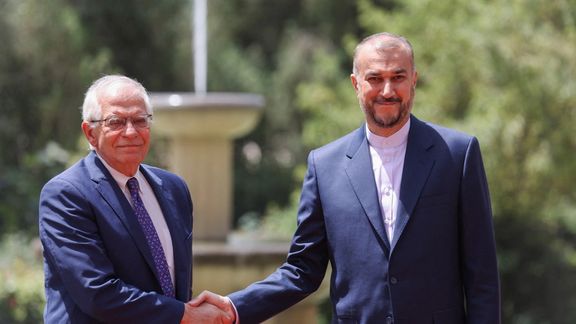Will Doha Talks Tackle ‘Unanswered’ Questions On Iran Nuclear File?

Qatar said in a statement Tuesday that if successful, US-Iran nuclear talks could open up “new prospects for wider regional cooperation and dialog with Iran.”

Qatar said in a statement Tuesday that if successful, US-Iran nuclear talks could open up “new prospects for wider regional cooperation and dialog with Iran.”
But Qatari optimism, which has seen the Persian Gulf state mediate in recent months, was not shared by United States and European officials, nor by opponents of the 2015 deal in Tehran.
The Virginia-based Politico news-site quoted a US official with “very low expectations” and two “senior Western officials” sharing the American’s pessimism and saying they expected the talks to last only two or three days.
In announcing the new round of talks while in Tehran Saturday, the European Union foreign policy chief Josep Borrell said nuclear talks in Vienna had been suspended in March with both Iran and the US needing to answer “questions.”
Those talks – involving Iran, and six world powers including indirectly the US – reportedly reached a broad understanding of what was needed to revive the JCPOA but did not bring complete agreement over which US sanctions were incompatible with the 2015 deal, which the US left in 2018. Iran was particularly irked over the inclusion since 2019 of its Revolutionary Guards on a US list of sanctioned ‘foreign terrorist organizations.’
While there have been suggestions from analysts as to how such obstacles might be cleared, the US and Iran have continued to place the onus on the other to move.
Go-betweens
Enrique Mora, a senior EU official, chaired the Vienna talks and is expected to lead a team of European officials in Qatar acting as go-betweens for US and Iranian negotiators. Iran has refused to meet the US directly.
Qatar’s role may be less formal. The Persian Gulf state has good relations with both Washington and Tehran, and played a discrete but effective role in negotiations between the US administration of President Donald Trump and the Taliban that led to their 2020 agreement over US military withdrawal from Afghanistan.
But opponents of restoring the JCPOA are vocal in both Tehran and the US. In Israel, Prime Minister Naftali Bennett has slammed military and intelligence leaders – including reportedly the head of military intelligence Major General Aaron Haliva– who favor the JCPOA.
It remains unclear whether the US encouraging Israeli-Saudi military cooperation as a way to reconcile the two states to a revived JCPOA, or as a genuine attempt to bolster a new regional defense architecture against Iran and its regional allies, including Hezbollah, and Ansar Allah in Yemen.
Last chance?
Some analysts see the Qatar talks as the last chance for the US and Iran to agree over bringing back the JCPOA.
Robert Malley, the US special envoy who leads the US negotiators in Qatar, told the Senate in May that the US would continue to work to restore the JCPOA as long as “we assess that the non-proliferation benefits of a return to the deal are worth the sanctions lifting we would need to provide.”
Critics of the JCPOA argue any benefits are running out. Rafael Mariano Grossi, director general of the International Atomic Energy Agency, told a news conference in Vienna June 9 that, given Iran’s restrictions on agency monitoring, four weeks remained to restore enough inspector’s access to avoid a “fatal blow” to the IAEA’s ability to certify the Iranian nuclear program as peaceful. Iran began exceeding JCPOA limits in 2019, the year after the US left the agreement, and is now enriching uranium to 60 percent, far above the 3.67 percent allowed under the JCPOA.